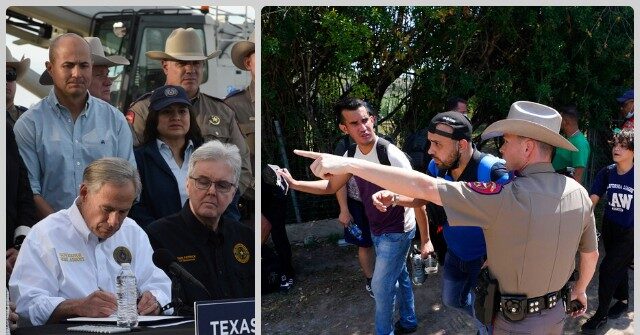Top News
Texas Governor Signs Bill Making Illegal Migrant Entry from Mexico a State Crime

Texas Governor Greg Abbott signed a bill making Texas the first state in the union to give law enforcement officers the authority to arrest migrants who illegally enter the state. The measure, SB 4, was signed into law on Monday during a ceremony at the base of the border wall in Brownsville, Texas.
The bill is part of a package of measures designed to decrease the flow of migrants entering the state from Mexico. The Texas Legislature passed the bills during two special sessions this fall.
Today in Brownsville, I signed three new laws to better protect Texans AND Americans from Biden’s open border policies.
Illegal entry into Texas is now a crime subject to removal or imprisonment.
Texas will also fund new wall construction & increase human smuggling penalties. pic.twitter.com/EVGcYf4HJs
— Greg Abbott (@GregAbbott_TX) December 19, 2023
Governor Abbott was joined at the bill signing ceremony by Lieutenant Governor Dan Patrick, National Border Patrol Council (NBPC) President Brandon Judd, Adjutant General of Texas Major General Thomas Suelzer, Texas Border Czar Mike Banks, Senator Pete Flores, Senator Joan Huffman, Senator Charles Perry, Representative Ryan Guillen, Representative Jacey Jetton, Representative David Spiller, Representative Mano DeAyala, Representative Stan Kitzman, Representative Janie Lopez, and other border officials. House Speaker Dade Phelan was not present for the historic event.
Senate Bill 4 from Special Session #4 makes illegal entry into Texas from a foreign country a criminal offense. The law is the latest attempt by the state to crack down on migrants illegally entering the state between ports of entry. By creating the offense of illegal reentry, offenders can be penalized with sentences of up to 20 years in prison. It also provides the mechanism to order an offender to return to the foreign nation from which they entered or attempted to enter this state. The law provides civil immunity and indemnification for local and state government officials, employees, and contractors for lawsuits resulting from enforcing these provisions.
The law is similar to a current federal statute under Title 8 of the United States Code 1325, which makes illegal entry into the United States a misdemeanor offense for a first-time offender and a felony for a second offense. Under the current administration, the federal statute is not pursued to any significant degree.
Also similar to proceedings carried out under federal law, migrants may agree to return to their home country as part of sentencing agreements. The process in federal courts is known as Stipulated Deportation, where a previously deported migrant waives his right to a separate immigration hearing and agrees to removal as part of the sentencing process.
The State has also increased penalties for other immigration offenses normally reserved to the federal government. The Texas Legislature passed bills, signed by Abbott, that creates a mandatory ten-year minimum prison sentence for smuggling of persons and continuous smuggling of persons. That law enhances the criminal penalties for operating a stash house and creates a mandatory five-year minimum prison sentence. It also further enhances criminal penalties for victim-related offenses that occurred during the commission of smuggling, such as assault and burglary.
The bill criminalizing the illegal entry of migrants into Texas is the latest facet of a larger movement to reduce migrant crossings. In 2021, Abbott launched Operation Lone Star, an initiative that involves deploying Texas Department of Public Safety Highway Patrol Troopers and Texas Army National Guard soldiers to the border region.
The operation also employs the Texas Department of Emergency Management to coordinate the busing of migrants released by the Border Patrol to sanctuary cities farther inland, including New York City, Chicago, and Denver, among others.
The law will likely face a quick legal challenge by the Biden Administration, which has taken the Governor’s previous attempts to reduce the flow of migrants to court. A case to decide whether Abbott must remove the floating border buoy barrier installed in the Rio Grande near Eagle Pass is still moving through the federal court system.
Randy Clark is a 32-year veteran of the United States Border Patrol. Prior to his retirement, he served as the Division Chief for Law Enforcement Operations, directing operations for nine Border Patrol Stations within the Del Rio, Texas, Sector. Follow him on Twitter @RandyClarkBBTX.
Read the full article here


















